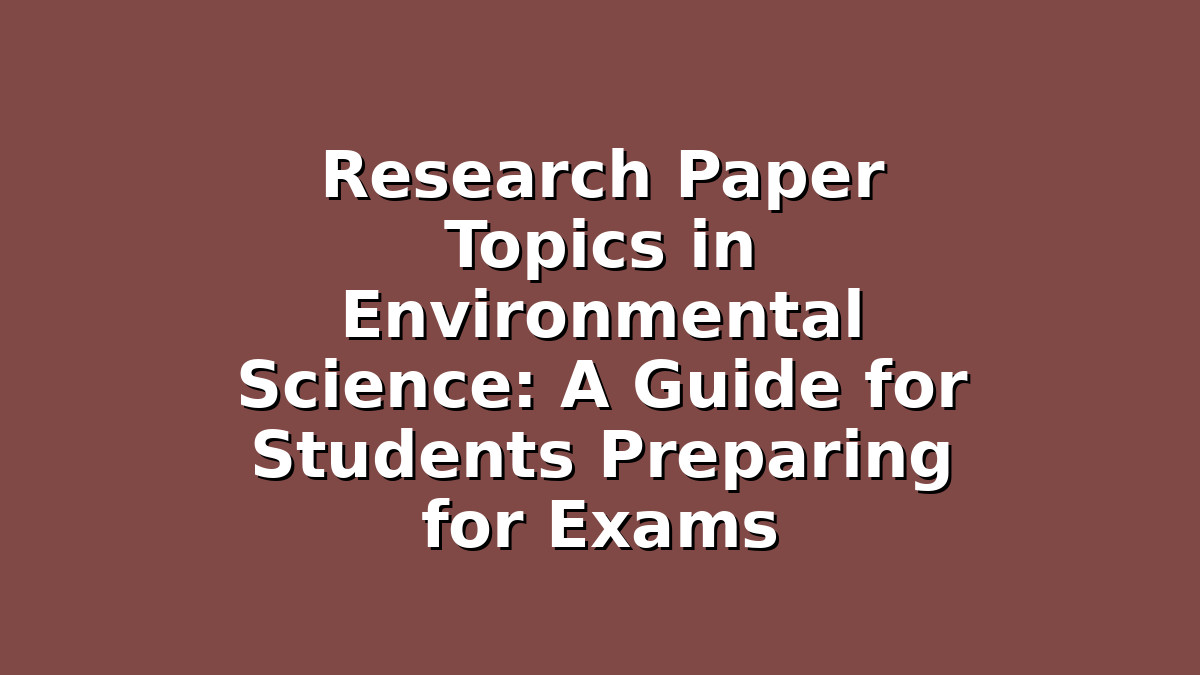Environmental science is an exciting and rapidly evolving field that explores the complex relationship between humans and the natural world. For students preparing for exams or looking to enhance their understanding of critical environmental issues, selecting the right research paper topic can be both inspiring and challenging. This article aims to help you discover engaging research paper topics in environmental science, while offering practical study tips to improve your preparation and writing process.
Understanding Environmental Science and Its Importance
Before diving into specific topics, it’s essential to understand what environmental science encompasses. This interdisciplinary field combines biology, chemistry, geology, and social sciences to analyze environmental problems and propose sustainable solutions. Examining environmental issues through research allows students to think critically, develop problem-solving skills, and contribute to a healthier planet.
When preparing for exams, focusing on relevant, timely topics can make your study sessions more meaningful and enjoyable. Choosing a research paper topic that excites you will keep you motivated and encourage deeper learning.
Section 1: Choosing Engaging and Relevant Research Paper Topics
Selecting a topic is the foundation of a successful research paper in environmental science. Here are some tips to help you pick an engaging and relevant topic:
1. Identify Your Interests: Think about which areas of environmental science fascinate you most. Is it climate change, pollution, conservation, or renewable energy? Passion fuels perseverance, especially when preparing for demanding exams.
2. Consider Current Environmental Issues: Topics related to ongoing global challenges tend to have abundant resources and are more impactful. Examples include plastic pollution, deforestation, endangered species, or the impact of urbanization on ecosystems.
3. Check Resource Availability: Ensure there is enough credible research material available. Academic journals, government websites, and environmental organizations often provide up-to-date studies and statistics.
4. Make It Manageable: Avoid overly broad topics like “Global Warming.” Instead, narrow it down to something specific, such as “The Effects of Global Warming on Coral Reefs” or “Urban Heat Islands and Their Impact on City Life.”
Sample Research Paper Topics:
– The Role of Renewable Energy in Reducing Carbon Emissions
– Impact of Plastic Waste on Marine Life
– Deforestation and Its Effects on Biodiversity
– Sustainable Agriculture Practices and Food Security
– Environmental Policies and Their Effectiveness in Air Pollution Control
– The Relationship Between Urbanization and Water Quality
– Climate Change and Its Impact on Arctic Wildlife
– Waste Management Strategies in Developing Countries
Section 2: Study Tips for Researching and Writing Your Paper
Once you have your topic, the next step is effective research and writing. Here are some strategies tailored for exam preparation and academic success:
1. Plan Your Time Wisely: Break down your research and writing process into manageable chunks. Allocate specific times for researching, outlining, drafting, revising, and proofreading your paper. Using a timetable can reduce stress and improve focus.
2. Use Credible Sources: Prioritize peer-reviewed journals, reputable books, and official environmental agency reports. Reliable sources strengthen your arguments and improve the quality of your paper.
3. Take Organized Notes: While researching, highlight important points and note their sources. This habit prevents plagiarism and makes referencing easier when writing your bibliography.
4. Create an Outline: An outline helps structure your paper logically. Typically, it should include an introduction, body sections with main arguments, and a conclusion that summarizes findings and suggests solutions or future research.
5. Focus on Clarity and Precision: Use clear, concise language to explain complex environmental concepts. Avoid jargon unless it’s defined, ensuring your paper is accessible to a broad audience, including your examiners.
6. Review and Revise: Edit your paper several times. Check for grammar, spelling, and factual accuracy. You can also ask a peer or teacher to review your work for objective feedback.
Section 3: Tips for Exam Preparation Using Your Research Paper
Research papers are excellent tools for reinforcing your understanding of environmental science topics, and can be integral to exam preparation. Here’s how to use your research paper effectively:
1. Deepen Your Understanding: Writing a research paper requires in-depth study. Use this as an opportunity to explore your topic beyond textbook summaries, which can enhance your exam answers.
2. Practice Summarizing Key Points: Condense your research findings into bullet points or flashcards. This makes review sessions quicker and helps with memory retention.
3. Develop Critical Thinking: Analyze environmental issues from various perspectives in your paper. This skill is valuable for answering essay-style questions and forming well-rounded arguments during exams.
4. Apply Real-World Examples: Incorporate case studies or recent environmental events in your study notes. Examiners appreciate candidates who can connect theory with real-world applications.
5. Simulate Exam Conditions: After completing your paper, test your knowledge by writing brief essays or answering questions based on your research. This practice builds confidence and improves time management skills during exams.
6. Stay Updated: Environmental science is dynamic, with new discoveries and policies emerging continuously. Follow reliable news sources or scientific publications alongside your studies to stay informed and relate current developments to your exam topics.
Conclusion
Choosing the right research paper topic in environmental science can transform your exam preparation from a daunting task into an exciting journey of discovery. By selecting relevant, interesting topics and employing effective study and writing strategies, you’ll not only produce a high-quality research paper but also deepen your understanding of crucial environmental challenges. Remember to stay organized, use credible sources, and connect your research to broader concepts and real-world issues. With dedication and smart study habits, you can excel in both your research papers and your exams, contributing meaningfully to the future of environmental science.
Good luck with your studies, and remember that every step toward understanding our environment is a step toward a more sustainable future!

Responses